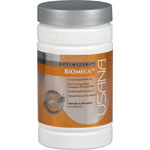Benefits of BiOmega
Can I remove the liquid from BiOmega capsules?
The primary concern with breaking open BiOmega capsules is that it can be difficult to empty the capsule completely, which may reduce the amount of active ingredients you receive. (Also, it can be difficult to mask the taste of extracted fish oil.)
Assuming the taste doesn’t bother you and you are able to empty the capsule completely, there shouldn’t be a problem with consuming BiOmega this way. Just be sure to use the liquid immediately, as it was not designed to be exposed to air.
Can I take USANA BiOmega during pregnancy?
Yes, BiOmega can be taken during pregnancy.
Research has clearly shown that essential fatty acids are important for developing babies, and many women don’t get enough from diet alone. During pregnancy, the omega-3 fatty acids in BiOmega will support your child’s brain, eye, and nerve development, particularly during the last trimester.
Can I take BiOmega if I have an allergy to fish?
For individuals with a specific allergy to fatty fish (e.g. salmon, mackerel, herring), BiOmega would not generally be recommended except on the advice of a physician.
For individuals with shellfish-specific allergies (e.g. shrimp, crab, lobster), BiOmega should not be a problem as it does not contain any shellfish ingredients.
Can children take USANA Vitamins BiOmega?
Like most of USANA‘s Optimizers (with the exception of USANA Body Rox Active Calcium Chewable and OptOmega), BiOmega is generally not recommended for children under the age of 18. In part, this is because the BiOmega gelcaps are quite large, making them difficult for many children to swallow.
We are aware that under certain circumstances BiOmega may be useful for children, but the recommendation for use should always come from a physician or other healthcare provider.
Does BiOmega contain trans-fat?
All of USANA‘s products, including BiOmega, are completely free of trans-fatty acids.
Does BiOmega contain vitamin A?
No, BiOmega does not contain vitamin A.
Unless added by the manufacturer, only fish oil supplements specifically made from fish liver (such as cod liver oil) will contain vitamin A.
How do I eliminate the fishy aftertaste associated with fish oil supplements?
Lemon oil is added to BiOmega to help reduce the potential for fishy aftertaste.
If you still find the taste bothersome, try taking BiOmega with a meal.
How is BiOmega purified?
BiOmega is purified using high vacuum molecular distillation.
(We actually distill the product twice to ensure a maximum level of purity.)
Is BiOmega free from heavy metals and other contaminants?
Yes, for all practical intents and purposes. It is not possible – nor is it necessary – to have a product that is absolutely and completely free of any contaminants. No matter how much purification is done, a trace can always be found depending on the sensitivity of the testing method.
Take mercury, for example. BiOmega is as purified as it gets with regard to mercury, and is tested to contain a maximum of 0.01 ppm (parts per million). In other words, it is at least 99.999999% free of mercury. This level is thousands of times lower than a typical can of tuna fish and well below the acceptable safe level (1 ppm, as specified by the FDA).
Why does BiOmega contain lemon oil?
Some individuals may notice a “fishy” aftertaste after swallowing a fish oil supplement. Natural lemon oil is added to each BiOmega capsule to improve palatability.
What fish species are used to make BiOmega?
BiOmega is made from deep-sea cold water fish species (primarily anchovies and sardines).
Why doesn’t BiOmega contain omega-6 or omega-9 fatty acids?
Fish oil typically contains minimal amounts of omega-6 and omega-9 fatty acids. If a company were to add dietarily significant amounts of these nutrients to a fish oil supplement, the size and/or number of capsules would have to be increased dramatically.
In addition, omega-6 fatty acids tend to be more prevalent in the diet than omega-3’s, and while omega-9 fatty acids are beneficial and healthy they are not considered “essential” (since the human body is capable of synthesizing them).
If you are interested in a balanced omega 3-6-9 product, a plant-based product like OptOmega would be more appropriate. The flaxseed oil in OptOmega provides substantial omega-3’s, and the combination of other oils provides both omega-6 and omega-9 fatty acids. OptOmega is also a good option for vegetarians and those with fish allergies.
BiOmega, on the other hand, is less of a “basic” omega fatty acid product and more of a specific (or targeted) product especially useful in cardiovascular health.
Why is vitamin D added to BiOmega?
Vitamin D is manufactured by the human body upon exposure to sunlight. Varying amounts of sun exposure, the regular use of sunscreen, and other factors can influence vitamin D levels.
Many experts now believe that most people do not get enough vitamin D. In addition, vitamin D is not found naturally in significant amounts in fish oil or fish oil products. Both omega-3 fatty acids and vitamin D are essential to the diet, and fish oil is an ideal delivery medium for vitamin D (because vitamin D is fat-soluble).
Based on a careful consideration of all these factors, USANA has chosen to make vitamin D an integral part of the BiOmega product.


